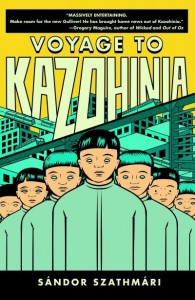“That’s one of the great things about the feed– that you can be supersmart without ever working. Everyone is supersmart now. You can look things up automatic, like science and history, like if you want to know which battles of the Civil War George Washington fought in and shit” – Titus, in Feed (47).
Dialect and slang can define culture– especially youth culture. Dystopian fictions often represent class difference through changes in dialect, but in the case of novels featuring young adult or teen characters, often it is the language that used that reinforces their youth. Feed by M.T. Anderson and A Clockwork Orange by Andrew Burgess are both characterized by language, as they are written in dialect. Feed features Titus and his friends and family, who have less of a use for language after the implantation of a “feed” directly into their neurological wiring. They communicate via chat with each other and are influenced or directed by advertisements wired directly into their brains. A Clockwork Orange‘s dialect, Nasdat, is used almost exclusively by the violent youth culture– especially the story’s narrator, Alex, who changes up his speech patterns based on the people around him…and whether he wants something from them.
In Feed, everyone appears to use the same type of slang– even the President of the United States is quoted as having called another head of state a “shithead” in a speech, which some desperate government official attempts to cast as a compliment, given the fertilizing power of manure. The exception here appears in Violet, the love interest of Titus, and her father. Violet’s father is a professor of dead languages, which she explains to Titus are those that “were once important but that nobody uses anymore. They haven’t been used for a long time, except by historians” (37). The dead languages that she references appear to be variations of computer code, and when she writes examples for Titus by hand, he’s impressed by the fact that she knows how to write with a pen. Physical words– written words– seem to have all but disappeared from the world of Feed, leaving only the digitally communications transmitted via the feed behind. When Titus meets Violet’s father for the first time, he sees their house and notes that “the place was a mess. Everything had words on it. There were papers with words on them, and books, and even posters on the wall had words” (135). Titus and his generation associates written words with sloppiness, with clutter, with trash not yet disposed of. In response to this rejection of language, we see Violet’s father– a man so obsessed with the preservation of language that he is no longer understood when he speaks. Violet explains to Titus that “[my father] says the language is dying. He thinks words are being debased. So he tries to speak entirely in weird words and irony, so no one can simplify anything he says” (137). But when he actually speaks, his language is also telling– he combines slang and word usage from different eras, as if they bleed together as one in the history of language.
Language represents, then, the deterioration of culture as a whole in Feed. In A Clockwork Orange, we can read the use of slang in a similar way– except that it pertains exclusively to the youth culture in the story. Alex knows when to lapse into Nasdat and narrates the story in it, but has a grasp that older generations and those in official positions warrant a shift in tone and dialect that he refers to as his “gentleman’s goloss.” In speaking with the prison charlie, Alex says, “Sir, I have done my best, have I not?” before making sure to tell the reader that “I always used my very polite gentleman’s goloss govoreeting with those at the top” (62). This “gentleman’s goloss” appears at many other points in the novel as well– generally when Alex attempts to deceive or trick people into allowing him into their homes or speaking to his parole officer to try and convince him of his innocence and reform. It stands in contrast to the Nasdat slang that he speaks in the company of his gang or fellow prisoners in Staja (State Jail). Alex’s language is used as a tool, as manipulation– when asserting authority over his gang or over fellow prisoners, his Nasdat is flawless, but when he realizes that he has no power in the conversation, he attempts to manipulate people by showing him that he, too, can speak like an educated and polite ‘gentleman.’
Both stories immerse the reader in their dystopian context by writing the narrative in dialect, but Burgess and Anderson both reinforce the fact that the language of the story is not always the language of every character. In fact, the divergences from the dialects used by youth in the narrative seem to be powerful rhetorical moves that comment on authority, education, and willingness to participate in sometimes oppressive cultural norms– like the rampant consumerism and capitalism of Feed or the problem of youth violence in A Clockwork Orange.



